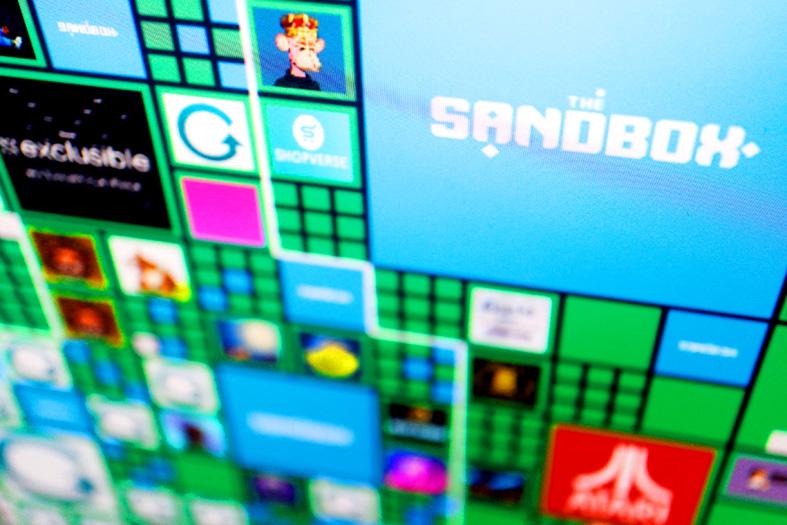Gaming companies FlickPlay and The Sandbox yesterday announced a new partnership that would allow players to use a blockchain asset on both platforms, representing a key step in the building of the metaverse.
The metaverse involves people moving freely between virtual worlds on different platforms, and taking their virtual clothing and other belongings with them, a concept called interoperability.
Such an idea is many years away and would require collaboration between companies and metaverse developers, including Facebook owner Meta Platforms Inc, Microsoft Corp and Epic Games Inc.

Photo: Reuters
FlickPlay is an app where players can unlock digital collectibles by using an interactive map of their actual surroundings, and then use their smartphone’s camera to overlay the collectibles onto the real world and interact with the objects to make videos and other content.
The app yesterday announced its first collection of non-fungible tokens (NFTs) called Flicky, which are to feature designs of an anthropomorphic chameleon wearing different clothes.
A portion of people who acquire a Flicky would be able to use the NFT as their avatar on The Sandbox, a Web and mobile game where players can build a three-dimensional virtual world.
Initially, Flicky owners would unlock a version of the chameleon to use on The Sandbox, but soon they will be able to use the exact version of the digital asset that is stored on the blockchain in both games, FlickPlay founder and chief executive Pierina Merino said, adding that the company is working with The Sandbox to reach interoperability by the end of this year.
The integration is notable because it might be the first to bridge an NFT in the virtual world with usage linked to the physical world, The Sandbox cofounder Sebastien Borget said.
The partnership with FlickPlay would help “create a more immersive experience that extends into the metaverse and The Sandbox,” Borget said.

TRADE WAR: Tariffs should also apply to any goods that pass through the new Beijing-funded port in Chancay, Peru, an adviser to US president-elect Donald Trump said A veteran adviser to US president-elect Donald Trump is proposing that the 60 percent tariffs that Trump vowed to impose on Chinese goods also apply to goods from any country that pass through a new port that Beijing has built in Peru. The duties should apply to goods from China or countries in South America that pass through the new deep-water port Chancay, a town 60km north of Lima, said Mauricio Claver-Carone, an adviser to the Trump transition team who served as senior director for the western hemisphere on the White House National Security Council in his first administration. “Any product going

STRUGGLING BUSINESS: South Korea’s biggest company and semiconductor manufacturer’s buyback fuels concerns that it could be missing out on the AI boom Samsung Electronics Co plans to buy back about 10 trillion won (US$7.2 billion) of its own stock over the next year, putting in motion one of the larger shareholder return programs in its history. South Korea’s biggest company would repurchase the stock in stages over the coming 12 months, it said in a regulatory filing on Friday. As a first step, it would buy back about 3 trillion won of paper starting today up until February next year, all of which it would cancel. The board would deliberate on how best to effect the remaining 7 trillion won of buybacks. The move

China’s Huawei Technologies Co (華為) plans to start mass-producing its most advanced artificial intelligence (AI) chip in the first quarter of next year, even as it struggles to make enough chips due to US restrictions, two people familiar with the matter said. The telecoms conglomerate has sent samples of the Ascend 910C — its newest chip, meant to rival those made by US chipmaker Nvidia Corp — to some technology firms and started taking orders, the sources told Reuters. The 910C is being made by top Chinese contract chipmaker Semiconductor Manufacturing International Corp (SMIC, 中芯) on its N+2 process, but a lack

NVIDIA PLATFORM: Hon Hai’s Mexican facility is to begin production early next year and a Taiwan site is to enter production next month, Nvidia wrote on its blog Hon Hai Precision Industry Co (鴻海精密), the world’s biggest electronics manufacturer, yesterday said it is expanding production capacity of artificial intelligence (AI) servers based on Nvidia Corp’s Blackwell chips in Taiwan, the US and Mexico to cope with rising demand. Hon Hai’s new AI-enabled factories are to use Nvidia’s Omnivores platform to create 3D digital twins to plan and simulate automated production lines at a factory in Hsinchu, the company said in a statement. Nvidia’s Omnivores platform is for developing industrial AI simulation applications and helps bring facilities online faster. Hon Hai’s Mexican facility is to begin production early next year and the